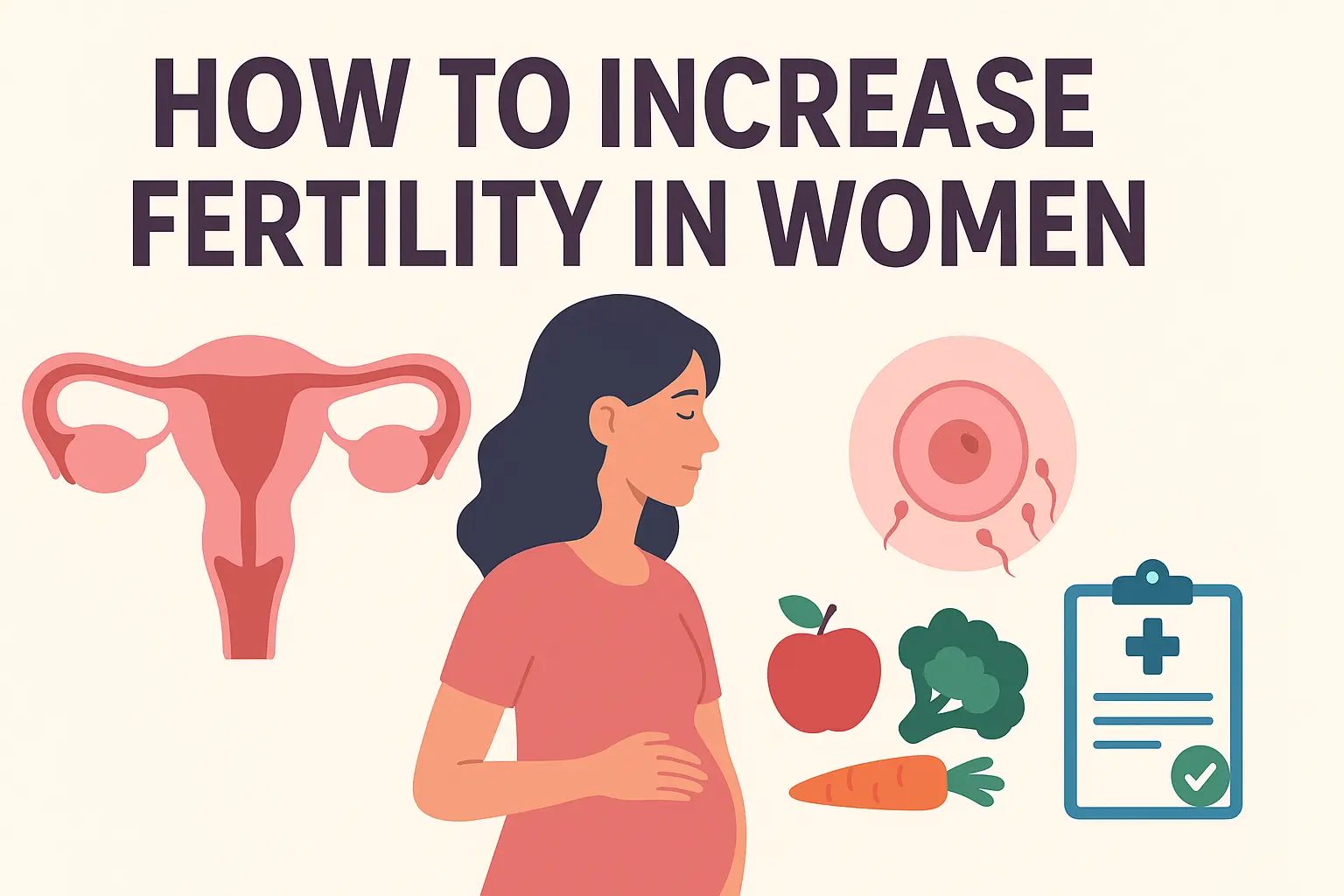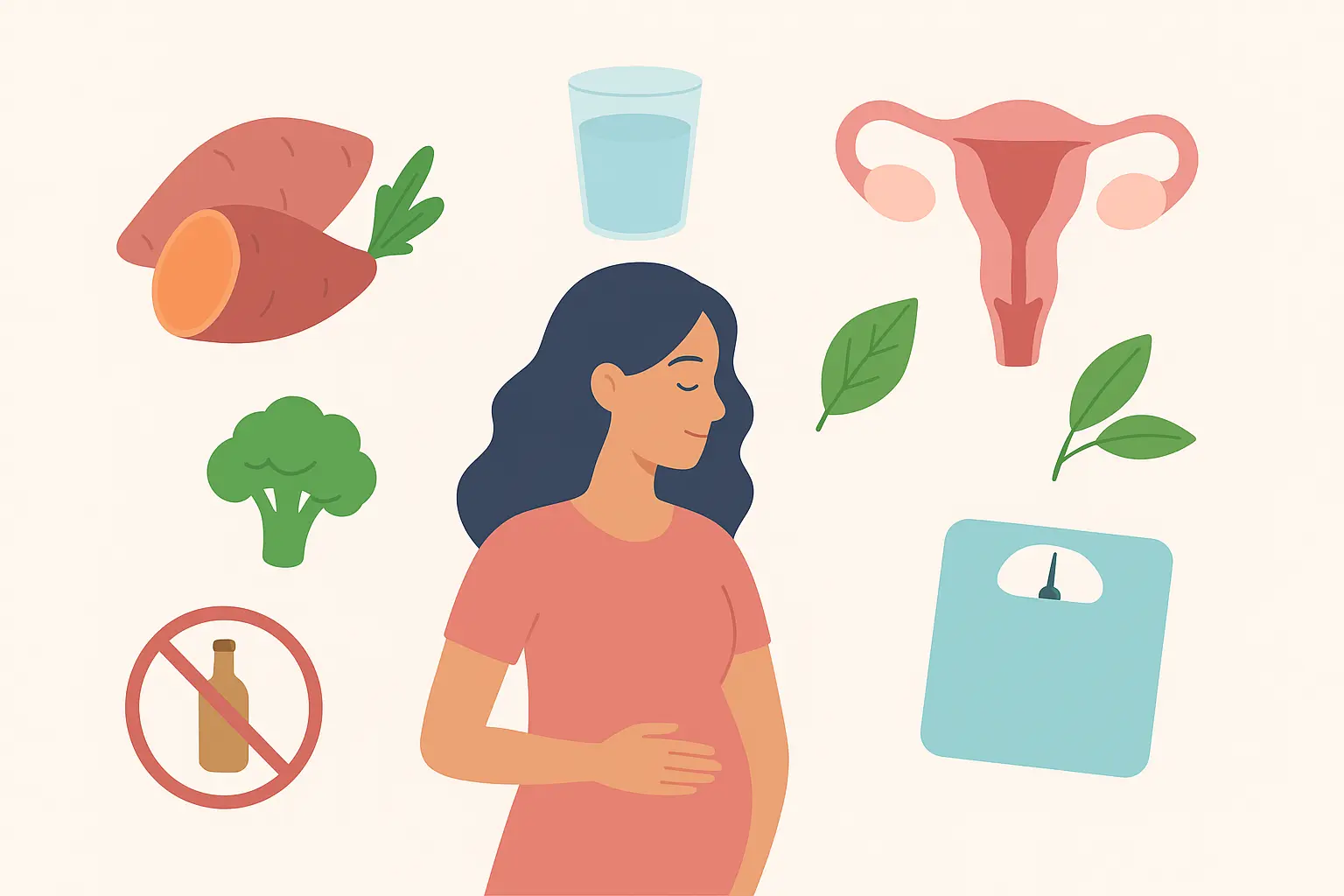How to Increase Fertility in Women: Diet, Lifestyle, and Medical Tips

Fertility in women is their ability to get pregnant. Pregnancy happens when the sperm enters through the vagina, into the fallopian tube, and fertilizes an egg. There are several things that couples can do to increase fertility, such as maintaining a healthy diet and lifestyle, avoiding substance abuse, etc. Understanding How to Increase Fertility in Women can help identify key lifestyle changes and medical options that support reproductive health and improve the chances of conception.
Improving fertility through making holistic health changes and getting timely medical support can reduce the chances of infertility or missed conception. In this blog, we will be talking about various measures you can take to increase your fertility as a woman.
Understanding Female Fertility

Female fertility is a woman’s ability to get pregnant and is influenced by various factors such as age, ovarian reserve, hormonal balance, etc. The fertility of a woman will be at its peak in her late teens and early twenties, and gradually decrease after the age of 30. The chance of successful conception is during the fertile window of the menstrual cycle. Understanding how to increase fertility in women can help maximize these fertile years and improve the likelihood of conception.
Hormonal imbalance, diminished ovarian reserve, disorders like thyroid, severe stress, substance abuse, and conditions like endometriosis, polyps, fibroids, or pelvic inflammatory diseases can impact fertility.
Common Causes of Low Fertility
Female fertility problems can be caused by various reasons, such as:
- Trouble ovulating and not having periods regularly.
- Polyps or fibroid growth in the uterus.
- Blockage or damage in the fallopian tubes which hinders the eggs from reaching the uterus.
- Endometriosis (tissue growth on the outside of the uterus).
- Early menopause, especially before the 40s.
- Pelvic or uterine adhesions.
- Aging and lifestyle.
- PCOS and premature ovarian failure.
- Hormonal imbalances.
- Low body weight and excessive exercise.
- Cancer treatments and certain medications that affect the hormones.
- Genetic factors.
Diet and Nutrition for Fertility
Best Foods to Boost Fertility
- Leafy green vegetables like spinach, kale, and chard are full of folate, which improves reproductive health.
- Fishes like salmon, mackerel, and sardines are good sources of omega-3 fatty acids, which support hormone production and increase blood flow.
- Nuts and seeds like walnuts, flaxseeds, and chia seeds are packed with healthy fats and antioxidants that improve sperm and egg health.
- Whole grains like brown rice, quinoa, and oats contain complex carbohydrates that regulate blood sugar levels, beneficial particularly for women with PCOS.
- Eggs are a good source of protein, vitamin D, and choline, essential for fetal development.
- Dairy products like Greek yogurt, cheese, etc., boost calcium and vitamin D, leading to better fertility outcomes.
- Berries are considered antioxidant-rich superfoods that increase the chance of pregnancy.
- Lean protein present in chicken, turkey, and beef provides amino acids essential for the production of reproductive hormones.
Foods to Avoid for Better Fertility
- Processed foods.
- Fried and baked foods, rich in trans fats.
- Excess sugar.
- Alcohol.
- Excessive caffeine intake.
Healthy Lifestyle Habits
Along with consuming nutrient-rich food items, following a healthy lifestyle is also important for optimal fertility.
- Avoiding substance abuse as alcohol and tobacco, can reduce the quality of eggs and sperm.
- Managing stress, as high levels of stress can disturb the hormonal balance.
- Prioritize quality sleep for 7-9 hours to regulate the hormonal balance.
- Exercise moderately regularly, as too much exertion can negatively affect ovulation
- Avoid exposure to environmental pollutants like chemicals, pesticides, and strong-smelling products.
- Increase the fiber intake while reducing sugar.
- Eating a balanced, nutrient-rich food items.
- Stay hydrated as it helps in the easy motility of sperm to the egg.
Track Ovulation and Timing
Tracking the ovulation and planning pregnancy according to the menstrual cycle can improve the chance of successful conception. Having intercourse during the fertile window increases the chance of pregnancy.
Using tools like an ovulation calculator or period tracker can make your pregnancy planning easier. Also, monitoring the vaginal discharge throughout the month will give a clear idea of the fertile period as the mucus becomes clear, stretchy, and slimy around ovulation.
Tracking the body temperature with a basal body temperature (BBT) thermometer, using an ovulation predictor kit, etc., can also help in planning a successful conception.
Medical and Natural Treatments
Medical treatments to improve fertility include taking drugs like clomiphene citrate, which stimulates ovulation. These medicines prompt the pituitary glands to release hormones that help in egg production and release.
Other treatment measures for fertility in women include Intrauterine Insemination (IUI) or In Vitro Fertilization (IVF), etc., based on the level of fertility.
Natural treatments mainly involve making amends in the lifestyle, consuming a healthy diet, taking prescribed supplements, managing stress, etc. Consult a doctor if you are not getting a successful outcome, even after regular unprotected sex for over a year.
Role of Hormones and Medical Tests
Hormones have a major role in reproductive health and fertility. Estrogen, progesterone, FSH, and LH are important for the proper functioning of the female reproductive system. Any imbalances in these hormone levels can affect fertility.
Conducting regular screening for the hormone levels can help the doctor see if there are any fluctuations and take proper treatment measures. The commonly done tests for hormone levels are blood tests and ultrasound scans.
When to Seek Medical Help?
If you are below 35 years and haven’t been able to conceive successfully after trying for over a year, and if you are above 35 and haven’t gotten pregnant after 6 months of unprotected sex, you are advised to seek immediate medical help.
How to Increase Fertility in Women: Final Thoughts
Consistent healthy habits and early medical advice can significantly boost fertility in women. If you have conditions like PCOS or any reproductive disorders, you are advised to seek medical help. Learning how to increase fertility in women can guide you toward effective lifestyle changes and treatments that support conception naturally.
Frequently Asked Questions
Staying at a healthy weight, preventing sexually transmitted infections, and maintaining a healthy lifestyle can boost fertility in women.
Timing your intercourse during the fertile window, near the day of ovulation. Also, having a healthy lifestyle and managing stress can improve the chances of getting pregnant.
Berries, citrus fruits, bananas, pomegranates, and figs are excellent for fertility.
While trying to get pregnant, it is advised to avoid smoking tobacco, exposure to toxins, drinking alcohol, and caffeine intake, etc.
Women are most fertile in their twenties, with peak fertility between 20 and 25. Fertility in women starts to decline after 30 years old.
